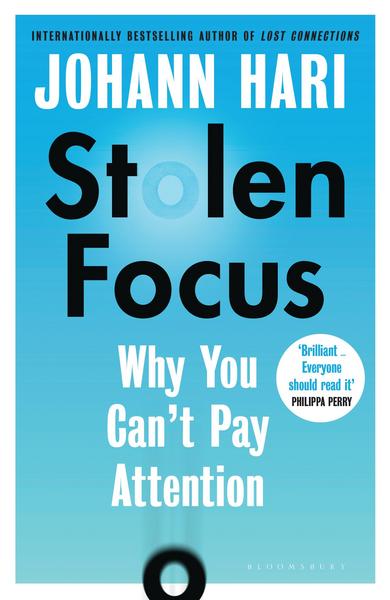 Zusammenfassungen
Zusammenfassungen
 Why have we lost our ability to focus? What are the causes? And, most importantly, how do we get it back?
Why have we lost our ability to focus? What are the causes? And, most importantly, how do we get it back? For Stolen Focus, internationally bestselling author Johann Hari went on a three-year journey to uncover the reasons why our teenagers now focus on one task for only 65 seconds, and why office workers on average manage only three minutes. He interviewed the leading experts in the world on attention, and learned that everything we think about this subject is wrong.
For Stolen Focus, internationally bestselling author Johann Hari went on a three-year journey to uncover the reasons why our teenagers now focus on one task for only 65 seconds, and why office workers on average manage only three minutes. He interviewed the leading experts in the world on attention, and learned that everything we think about this subject is wrong.
We think our inability to focus is a personal failing – a flaw in each one of us. It is not. This has been done to all of us by powerful external forces. Our focus has been stolen. Johann discovered there are twelve deep cases of this crisis, all of which have robbed some of our attention. He shows us how in a thrilling journey that ranges from Silicon Valley dissidents, to a favela in Rio where attention vanished, to an office in New Zealand that found a remarkable way to restore our attention.
Crucially, he learned how – as individuals, and as a society – we can get our focus back, if we are determined to fight for it.
 Kapitel
Kapitel 
- «Heutzutage kann man kein normales Gehirn besitzen» - der moderne Mensch leidet an einem kollektiven Aufmerksamkeitsdefizit. Wie gewinnen wir unser Denken zurück? (2022)


- 1. Cause One: The Increase in Speed, Switching and Filtering
- 2. Cause Two: The Crippling of Our Flow States
- 3. Cause Three: The Rise of Physical and Mental Exhaustion
- 4. Cause Four: The Collapse of Sustained Reading
- 5. Cause Five: The Disruption of Mind-Wandering
- 6. Cause Six: The Rise of Technology That Can Track and Manipulate You (Part One)
- 7. Cause Six: The Rise of Technology That Can Track and Manipulate You (Part Two)
- 8. Cause Seven: The Rise of Cruel Optimism - (or: Why Individual Changes are an Important Start, But Not Enough)
- 9. The First Glimpses of the Deeper Solution
- 10. Cause Eight: The Surge in Stress and How It Is Triggering Vigilance
- 11. The Places That Figured Out How to Reverse the Surge in Speed and Exhaustion
- 12. Causes Nine and Ten: Our Deteriorating Diets and Rising Pollution
- 13. Cause Eleven: The Rise of ADHD and How We Are Responding to It
- 14. Cause Twelve: The Confinement of Our Children, Both Physically and Psychologically
- 15. Conclusion - Attention Rebellion
 Dieses Buch erwähnt ...
Dieses Buch erwähnt ...
 Personen KB IB clear | Mihaly Csikszentmihalyi , Nir Eyal , B. J. Fogg , Adam Gazzaley , Paul Graham , Tristan Harris , Steve Jobs , Torkel Klingberg , Robert Levine , Roger McNamee , Jef Raskin , Larry D. Rosen , Donald Trump , Jean M. Twenge , Shoshana Zuboff , Mark Zuckerberg | |||||||||||||||||||||||||||||||||||||||||||||||||||||||||||||||||||||||||||||||||||||||||||||||||||
 Aussagen KB IB clear | Multitasking macht ineffizient | |||||||||||||||||||||||||||||||||||||||||||||||||||||||||||||||||||||||||||||||||||||||||||||||||||
 Begriffe KB IB clear |  Algorithmus Algorithmus algorithm
, attention deficit hyperactivity disorder (ADHD)attention deficit hyperactivity disorder
, algorithm
, attention deficit hyperactivity disorder (ADHD)attention deficit hyperactivity disorder
,  Aufmerksamkeit / Fokus Aufmerksamkeit / Fokus attention
, Bedeutung
, Blinder Fleckblind spot
, Cambridge Analytica
, attention
, Bedeutung
, Blinder Fleckblind spot
, Cambridge Analytica
,  Denken Denken thinking
, digital detox
, thinking
, digital detox
,  facebook
, facebook
,  Fake-News
, Flow-Erlebnis
, Fake-News
, Flow-Erlebnis
,  Fortnite
, Fortnite
,  Gehirn Gehirn brain
, brain
,  Gesellschaft Gesellschaft society
, society
,  Google
, Google
,  Instagram
, Instagram
,  Melatonin
, Melatonin
,  Mensch
, Moral
, Mensch
, Moral
,  Multitasking Multitasking Multitasking
, netflix
, Multitasking
, netflix
,  Politik Politik politics
, politics
,  Psychologie Psychologie psychology
, psychology
,  Schlaf Schlaf sleep
, sleep
,  social media / Soziale Medien social media / Soziale Medien social networking software
, social networking software
,  Twitter
, Twitter
,  Wissenschaft Wissenschaft science
, science
,  work-life-balance
, work-life-balance
,  WWW (World Wide Web) WWW (World Wide Web) World Wide Web
, World Wide Web
,  YouTube YouTube
| |||||||||||||||||||||||||||||||||||||||||||||||||||||||||||||||||||||||||||||||||||||||||||||||||||
 Bücher |
|
 Dieses Buch erwähnt vermutlich nicht ...
Dieses Buch erwähnt vermutlich nicht ... 
 Nicht erwähnte Begriffe | Bildungspolitik, Daten, Demokratie, Internet, snapchat, Wirtschaft |
 Tagcloud
Tagcloud
 Zitationsgraph
Zitationsgraph
 Zitationsgraph (Beta-Test mit vis.js)
Zitationsgraph (Beta-Test mit vis.js)
 Zeitleiste
Zeitleiste
 3 Erwähnungen
3 Erwähnungen 
- Was uns dumm macht (Michael Marti) (2022)


- The Anxious Generation - How the Great Rewiring of Childhood Is Causing an Epidemic of Mental Illness (Jonathan Haidt) (2024)

- The Sirens' Call - How Attention Became the World's Most Endangered Resource (Chris Hayes) (2025)


 Co-zitierte Bücher
Co-zitierte Bücher
 Volltext dieses Dokuments
Volltext dieses Dokuments
 | Stolen Focus: Gesamtes Buch als Volltext ( : 397 kByte) : 397 kByte) |
 |  «Heutzutage kann man kein normales Gehirn besitzen»: Artikel als Volltext ( «Heutzutage kann man kein normales Gehirn besitzen»: Artikel als Volltext ( : :  , 918 kByte; , 918 kByte;  : :  ) ) |
 Bibliographisches
Bibliographisches 
 Beat und dieses Buch
Beat und dieses Buch
Beat hat dieses Buch während seiner Zeit am Institut für Medien und Schule (IMS) ins Biblionetz aufgenommen. Beat besitzt kein physisches, aber ein digitales Exemplar. (das er aber aus Urheberrechtsgründen nicht einfach weitergeben darf). Es gibt bisher nur wenige Objekte im Biblionetz, die dieses Werk zitieren.





















 Biblionetz-History
Biblionetz-History